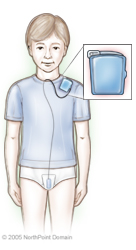Nocturnal enuresis is a child’s involuntary release of urine at night. Nocturnal enuresis is a physical condition; it is not psychological. As the child grows and develops, most instances of nocturnal enuresis disappear.Nocturnal enuresis is usually not considered a problem until the child ages. Treating nocturnal enuresis is important for a child in developing better self-confidence, self-image, and reducing anxiety.
If the physician decides that treatment is necessary, he or she may begin with behavior modification techniques.
If nocturnal enuresis does not improve after 1 to 4 months of behavior modification therapies, the physician may recommend medications.
In a small number of cases, a medical cause may exist. In these cases, the physician will usually treat the underlying cause. Treatment for secondary enuresis may include:
- Medication for an unstable bladder;
- Surgery for an obstruction or blockage;
- Counseling for a traumatic event; or
- Antibiotics for an infection.
WHEN IS IT INDICATED?
Physicians debate when to start a treatment program for children with nocturnal enuresis. Some physicians do not feel that treatment is necessary before age 6. Physicians often discourage treatment at a younger age because of high relapse rates.
PRETREATMENT GUIDELINES
Before any treatment can begin, the physician may request that the parents maintain a voiding diary of the child’s urinary habits for up to 2 weeks.
If the physician suspects secondary enuresis, he or she may recommend one or more of the following diagnostic tests:
- Voiding cystourethrogram;
- Cystoscopy;
- Magnetic resonance imaging; or
- Urine flow study.
Parents should always inform the physician if the child has any allergies to medications or foods. Parents should also inform the physician if the child is taking any medications or dietary supplements.
Desmopressin acetate arginine vasopressin (DDAVP) nasal spray is not recommended if the child has chronic allergies and nasal congestion. Before imipramine is prescribed, parents should inform the physician if the child has asthma. Asthma may decrease the benefits of imipramine.
WHO IS ELIGIBLE?
All children with nocturnal enuresis are eligible for behavior modification.
Medications are not recommended for children younger than age 6. Children with a known allergy or sensitivity to a drug are not eligible to take it.
WHAT TO EXPECT
Treatments for bedwetting take time and patience from the parents. In some cases the child will simply outgrow nocturnal enuresis.
The physician will usually recommend behavior modification first. Types of behavior modifications include:
- Alarm therapy;
- Bladder training; and
- Responsibility reinforcement.
When behavior therapies do not resolve nocturnal enuresis, the physician may prescribe medications, including:
- DDAVP;
- Imipramine; or
- Anticholinergic agents.
POST-TREATMENT GUIDELINES
To prevent relapse, children need to be slowly weaned from the medications. The physician will provide the parent with the necessary dosing information.
POSSIBLE COMPLICATIONS
Side effects from medications can be mild, such as gastrointestinal upset and headaches, but rarely, they can be deadly.
If side effects do not stop after a few days or become serious, the parent should contact the physician immediately.
Side effects from medications to treat nocturnal enuresis include an increase in body temperature from anticholinergic agents and water intoxication from DDAVP (this is rare).
LIFESTYLE
Bedwetting is not a condition or illness, it is a natural part of the child’s physical maturing process. Children develop at different rates. Parents should be patient as their child learns these skills and avoid punishing the child for wetting the bed.

